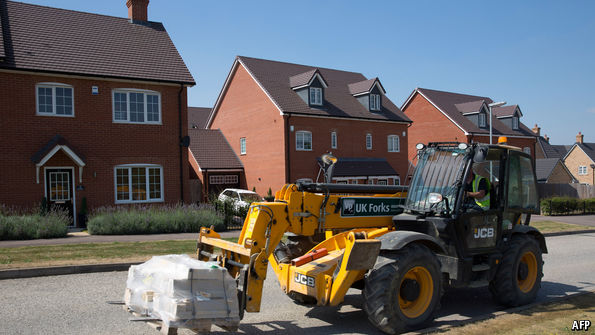
Why house prices haven’t fallen since the Brexit vote
12-09-2016
As safe as…
Why the vote for Brexit has not reduced house prices

“HOUSE prices will be hit by at least 10% in the ‘profound economic shock’ that would result from a vote to Leave the EU,” the Treasury warned in May, a month before the referendum. A fall of nearly 20% in two years was quite possible, it added. The housing market certainly looked ready for a correction: in 2015 the ratio of house prices to median incomes in England was 7.6, probably the highest ever.
Yet nearly six months on from the referendum, the forecasts look wide of the mark. Data from Zoopla, a property website, suggest that since June the value of the average house has actually risen a little, to over £300,000 ($383,000). In London it is also up and is now nearing £700,000. The Office for Budget Responsibility (OBR), the fiscal watchdog, recently revised down its forecast for house-price growth in the coming years—but only slightly. The share prices of big construction companies, which crashed the day after the vote, have recovered most of their losses.
The housing market has held up partly because, so far at least, the broader economy has performed better than expected since the referendum. There is a fairly strong correlation between the unemployment rate and house prices, and a weaker one with income growth. When people are in work and earning well, they more easily keep up with their mortgage or decide to take out a fresh one. Since June, unemployment has remained steady (though job growth is stagnating) and earnings are still growing (though more slowly than before). This points towards slower house-price growth, but no slump.
Extra demand has run up against reduced supply as people have become more cautious about selling their home. Estate agents, fretting about lost business, offer steep discounts on selling fees.
Inflation may be the weakest link in the chain. The OBR reckons that inflation will approach 3% in 2017 as the weak pound translates into higher import prices. If that happens then the Bank of England, whose inflation target is 2%, may at last raise interest rates. That in turn would raise the cost of mortgages.
But the bank is circumspect. Just as it did not cut interest rates after inflation fell to -0.1% in October 2015, nor will it rush to raise them as inflation increases. In any case, Britons have locked in cheap borrowing for years: nine in ten mortgages issued since the referendum have been fixed-rate. And most homeowners could cope with higher rates: at no time since current records began, in 1974, have Britons devoted less of their income to mortgage-interest repayments than they do now.
What if all the forecasters are wrong and the economy will soon be suffering from high inflation, tumbling earnings and soaring unemployment? Prices would certainly fall, but even then the Treasury’s blood-curdling predictions would probably not come to pass.
This is, perversely, thanks in part to the sclerotic planning system, which means that Britain has under-built for decades, and especially since the financial crisis of 2008-09. Persistent undersupply means that even in recessions the country is rarely left with surplus houses. And Britain is unlike America, where mortgagors can simply hand the keys back to an estate agent and walk away from their debt (a process that can result in houses flooding the market). The peculiarities of Britain’s housing market, in sum, militate against big price declines: in 2007-11, house prices fell by two-thirds as much as in America.
The biggest risk, rather, is that Brexit reinforces structural problems in the housing market. If fewer people buy and sell properties, greater numbers of rich pensioners will end up staying in houses too big for them after their children have flown the nest, in effect reducing the supply of housing for others. And if European workers are put off or prevented from coming to Britain, the country’s building capacity will shrink, making it even harder for the government to hit its target of building 250,000 homes a year.
For young people, among whom the rate of home-ownership has halved in the past generation, all this is galling. Most of them voted to Remain; the prospect of a slump in property prices was one of Brexit’s few silver linings.

